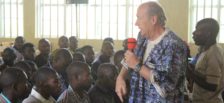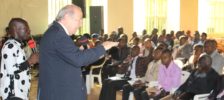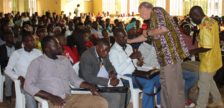 The mission to the Democratic Republic of the Congo has been in my heart for several years – beginning with a Congolese couple who were students at the Bible school. As I got to know Isaac and Julie Mapatano, I came to have a deep respect for their sincere faith and their love for people – and especially for their fellow countrymen back home in the Congo. Both were employed and making good salaries in the US, but felt led to give up that security to be trained for the ministry so that they could make a difference in the lives of people of the Congo. However, tragedy struck during their first year in the Bible school, Isaac was suddenly taken away by a massive heart attack, leaving Julie with seven children to support, no job, and school and hospital bills to pay with no insurance or savings. With a supernatural determination, she stepped out in faith and believed God to provide for her and her family – and He did, miraculously paying off the hospital bills, supernaturally supplying all the family’s needs, and phenomenally comforting Julie and the children through the whole ordeal. Julie continued in her Bible school training and joined me on a mission trip to Nicaragua as part of her second-year requirements. It was during this trip that I saw something amazing in her – the heart of a mother. She was always caring for the other team members as if they were her own children – as if she didn’t already have enough of her own. Much later, I discovered that her original African name – as well as the English equivalent – actually means, “Mother of Many Children.” And, indeed, it seems that her mother was prophetic when she gave her that name because Julie – in spite of her own needs – has determined to find a way to feed, clothe, and provide school fees, uniforms, supplies, and medical care for the children and to supply food and clothing for the widows of her native Congo. Due to the wholesale slaughter of the men in the country during the civil war and the massive loss of life when sub-Saharan Africa was inundated with AIDS, there is a whole generation of men missing, leaving behind a population of widows and orphans – hurting souls that Julie has adopted as part of her incredible family.
The mission to the Democratic Republic of the Congo has been in my heart for several years – beginning with a Congolese couple who were students at the Bible school. As I got to know Isaac and Julie Mapatano, I came to have a deep respect for their sincere faith and their love for people – and especially for their fellow countrymen back home in the Congo. Both were employed and making good salaries in the US, but felt led to give up that security to be trained for the ministry so that they could make a difference in the lives of people of the Congo. However, tragedy struck during their first year in the Bible school, Isaac was suddenly taken away by a massive heart attack, leaving Julie with seven children to support, no job, and school and hospital bills to pay with no insurance or savings. With a supernatural determination, she stepped out in faith and believed God to provide for her and her family – and He did, miraculously paying off the hospital bills, supernaturally supplying all the family’s needs, and phenomenally comforting Julie and the children through the whole ordeal. Julie continued in her Bible school training and joined me on a mission trip to Nicaragua as part of her second-year requirements. It was during this trip that I saw something amazing in her – the heart of a mother. She was always caring for the other team members as if they were her own children – as if she didn’t already have enough of her own. Much later, I discovered that her original African name – as well as the English equivalent – actually means, “Mother of Many Children.” And, indeed, it seems that her mother was prophetic when she gave her that name because Julie – in spite of her own needs – has determined to find a way to feed, clothe, and provide school fees, uniforms, supplies, and medical care for the children and to supply food and clothing for the widows of her native Congo. Due to the wholesale slaughter of the men in the country during the civil war and the massive loss of life when sub-Saharan Africa was inundated with AIDS, there is a whole generation of men missing, leaving behind a population of widows and orphans – hurting souls that Julie has adopted as part of her incredible family.
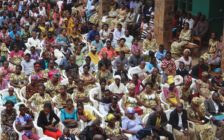 Furthermore, there is a background that makes Julie’s story even more impactful. Long before, she and her husband decided to leave their comfortable positions to attend Bible school, they had made some other incredible journeys. When civil war broke out in their region, Julie found herself isolated from her husband since he had taken a teaching job and Burundi and left her behind until arrangements could be made for her to join him at his new post. Now, suddenly surrounded by insurgents, she had to find a way to save her own life, the life of their first daughter, and the life of their unborn child. The only way she felt that she could protect herself was to flee over the mountains to her home village – a three-day journey on foot through extremely rough terrain. Eight months pregnant and with a toddler on her back, Julie began the unthinkable trek to what she hoped would be safety. Incredibly, she survived the journey – and fortunately, the baby did not come until after she reached the security of her parent’s village. As the rebel forces continued their atrocities, she knew that she had to somehow escape the country all together. Pretending to be making a simple trip to the market, she took the baby on her back and asked a friend to walk with the older child to make it look like they were just two mothers with one child each doing their shopping rather than a family trying to get out of town, Julie was able to slowly make her way – one increment at the time – until she reached the border where she was able to gain access as a refugee. By this time, she had lost all contact with Isaac and didn’t even know if he were dead or alive. Eventually, the Red Cross was able to locate him in another refugee camp in an entirely different country. By the grace of God, they were able to be reunited and were relocated as refugees in the US. Although she spoke her tribal language, Swahili (the trade language of her region in Africa), and French (the official language of the Congo), Julie found herself in a totally new environment where she couldn’t speak a word of the language. But, proving herself to be the resourceful woman she is, she taught herself to speak English and found her place in society.
Furthermore, there is a background that makes Julie’s story even more impactful. Long before, she and her husband decided to leave their comfortable positions to attend Bible school, they had made some other incredible journeys. When civil war broke out in their region, Julie found herself isolated from her husband since he had taken a teaching job and Burundi and left her behind until arrangements could be made for her to join him at his new post. Now, suddenly surrounded by insurgents, she had to find a way to save her own life, the life of their first daughter, and the life of their unborn child. The only way she felt that she could protect herself was to flee over the mountains to her home village – a three-day journey on foot through extremely rough terrain. Eight months pregnant and with a toddler on her back, Julie began the unthinkable trek to what she hoped would be safety. Incredibly, she survived the journey – and fortunately, the baby did not come until after she reached the security of her parent’s village. As the rebel forces continued their atrocities, she knew that she had to somehow escape the country all together. Pretending to be making a simple trip to the market, she took the baby on her back and asked a friend to walk with the older child to make it look like they were just two mothers with one child each doing their shopping rather than a family trying to get out of town, Julie was able to slowly make her way – one increment at the time – until she reached the border where she was able to gain access as a refugee. By this time, she had lost all contact with Isaac and didn’t even know if he were dead or alive. Eventually, the Red Cross was able to locate him in another refugee camp in an entirely different country. By the grace of God, they were able to be reunited and were relocated as refugees in the US. Although she spoke her tribal language, Swahili (the trade language of her region in Africa), and French (the official language of the Congo), Julie found herself in a totally new environment where she couldn’t speak a word of the language. But, proving herself to be the resourceful woman she is, she taught herself to speak English and found her place in society.
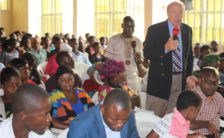 As I learned more and more about the work that she is doing in the Congo, my desire to go see it for myself continued to grow. However, it seemed that the opportunity to go was always delayed. When we finally made the decision to go this year, be began to run into one obstacle after another. When I contacted the visa agency, they informed me that we had a fifty-fifty chance of getting the visas and that if the visas were denied that there would be no explanation – simply a rejection letter. Furthermore, I was told that the process could take between seven to nine weeks since the Congolese embassy in the US no longer has the power to grant visas. The applications actually have to go to the Congo itself for review. This bit of news left me in a real predicament since I didn’t have that amount of time to be without my passport because I had essentially back-to-back trips to Colombia, Mexico, Sri Lanka, and the Philippines scheduled. Additionally, there was some concern as to when to apply for the visa since the visas are good for only three months – twelve weeks. This meant that the visas could expire before the trip if, for some reason, the they were granted shortly after we submitted them. On the other hand, we might have difficulty making the airline arrangements if we waited until fairly close to the travel dates to make the application and the visas were not granted until the last minute. Of course, we knew that it was not a good idea to book the tickets until after the visas were approved since most of the members of a team that had planned to go last year didn’t even get visas and the one member who was approved received her visa after the scheduled departure date. After doing a little research, I discovered that I was eligible to be issued a second passport so that I could have one to travel with while the second one was in the hands of the Congolese embassy. The process did require a trip to the passport office in Denver, but the application was approved on the spot and the new passport arrived in the overnight mail a couple days later. Fred Taylor had the same problem since he was scheduled to travel with me to the Philippines. Once we each had our new passports in hand, the applications for our team were sent off and the waiting game began. In the meantime, Julie had to make another trip to the Congo for a project that she is working with for the University of Florida. While in the country, her purse – containing her passport – was stolen. Miraculously, it was retrieved within a couple days. Three others who were planning to be part of the team had to drop out – one due to pregnancy, another because he was in the middle of moving to Europe and was having difficulties obtaining the required residency visa for the relocation, and the third because of an error on her visa application which kept her from receiving the visa in time to join the trip.
As I learned more and more about the work that she is doing in the Congo, my desire to go see it for myself continued to grow. However, it seemed that the opportunity to go was always delayed. When we finally made the decision to go this year, be began to run into one obstacle after another. When I contacted the visa agency, they informed me that we had a fifty-fifty chance of getting the visas and that if the visas were denied that there would be no explanation – simply a rejection letter. Furthermore, I was told that the process could take between seven to nine weeks since the Congolese embassy in the US no longer has the power to grant visas. The applications actually have to go to the Congo itself for review. This bit of news left me in a real predicament since I didn’t have that amount of time to be without my passport because I had essentially back-to-back trips to Colombia, Mexico, Sri Lanka, and the Philippines scheduled. Additionally, there was some concern as to when to apply for the visa since the visas are good for only three months – twelve weeks. This meant that the visas could expire before the trip if, for some reason, the they were granted shortly after we submitted them. On the other hand, we might have difficulty making the airline arrangements if we waited until fairly close to the travel dates to make the application and the visas were not granted until the last minute. Of course, we knew that it was not a good idea to book the tickets until after the visas were approved since most of the members of a team that had planned to go last year didn’t even get visas and the one member who was approved received her visa after the scheduled departure date. After doing a little research, I discovered that I was eligible to be issued a second passport so that I could have one to travel with while the second one was in the hands of the Congolese embassy. The process did require a trip to the passport office in Denver, but the application was approved on the spot and the new passport arrived in the overnight mail a couple days later. Fred Taylor had the same problem since he was scheduled to travel with me to the Philippines. Once we each had our new passports in hand, the applications for our team were sent off and the waiting game began. In the meantime, Julie had to make another trip to the Congo for a project that she is working with for the University of Florida. While in the country, her purse – containing her passport – was stolen. Miraculously, it was retrieved within a couple days. Three others who were planning to be part of the team had to drop out – one due to pregnancy, another because he was in the middle of moving to Europe and was having difficulties obtaining the required residency visa for the relocation, and the third because of an error on her visa application which kept her from receiving the visa in time to join the trip.
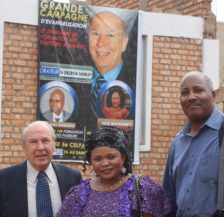 In addition to all the concerns over the visa, questions about the trip began to surface with news reports of increasing violence in the Congo with more than four hundred deaths and two hundred thousand being displaced and an attack on the police force resulting in the decapitation of forty-two officers. These hostilities couples with reports of an Ebola outbreak raised serious concerns among some of the team members. However, I had a special promise to fall back upon. When I was in Colombia, a gentleman came up to me with a handwritten note in Spanish. I was able to make out a few of the words, but asked a friend to translate it so I I could be sure that I understood. The message was that the gentleman had received a prophetic word from the Lord concerning me, and one of the four points was that I was supposed to go to Africa! With that confirmation of what I already felt in my heart, we pressed forward with the plans for the trip.
In addition to all the concerns over the visa, questions about the trip began to surface with news reports of increasing violence in the Congo with more than four hundred deaths and two hundred thousand being displaced and an attack on the police force resulting in the decapitation of forty-two officers. These hostilities couples with reports of an Ebola outbreak raised serious concerns among some of the team members. However, I had a special promise to fall back upon. When I was in Colombia, a gentleman came up to me with a handwritten note in Spanish. I was able to make out a few of the words, but asked a friend to translate it so I I could be sure that I understood. The message was that the gentleman had received a prophetic word from the Lord concerning me, and one of the four points was that I was supposed to go to Africa! With that confirmation of what I already felt in my heart, we pressed forward with the plans for the trip.
The visas were approved in time to make the necessary travel arrangements, and we actually found better flight schedules and prices than were available before we sent off our visa applications.
On the scheduled departure date, I met Julie at Colorado Springs Airport and flew to Denver and then to Newark and finally to Brussels. We met Fred at our arrival in Belgium since his flight had arrived just about fifteen minutes ahead of ours. When we checked in for the flight to Kigali, Rwanda, Julie and I were blessed with complimentary first-class upgrades. Upon our arrival in Africa, we spent the night in an airport hotel with no hot water or Wi-Fi – a good introduction to our mission experience. Early the next morning, we took a flight to a city on the border between Rwanda and the Congo. Since we were all carrying an extra piece of luggage with clothing and gifts for the orphans that Julie supports, we had a lot of hassle getting the airline to accept our overweight baggage. After paying a minimal fee, the airline accommodated us and we were on our way to the Congo!
We spent most of our first day meeting with the pastors and leaders that we were to be working with during our stay. Each meeting began with the typical African interview about the wife and kids for the first thirty minutes to an hour before we could address the real questions at hand. The following day, we took part in a 6 AM prayer meeting where I ministered on Romans 8:26-28, using the story of how God saved Dr. Sumrall in Tibet by directing him to turn left rather that right – a decision that would have led him directly into an ambush by marauders – as an illustration that things do work together for the good of believers if they first pray the situation through in the Holy Spirit. The rest of the day was spent in additional interviews with more Christian leaders.
The pastor of the church where the conference is to be held asked me to be part of an ordination service for two of his men who have started branch churches. When I was first invited to speak as part of the program, I had planned to use my “David’s Stick” sermon. However, when I realized that there was another main speaker, as the day went on, I decided to just get up and greet the people and sit down. Then the most unusual thing happened; they presented the new pastors with a walking stick as part of the ordination ceremony. At that point, I knew that I had the right message but not the time. So I did stand up and make a comment or two about the importance of the stick and sat down after about three minutes. When the service finally ended, they had a reception. A few people speak a very limited amount of English, but the ones who do all said that they wished that I had preached a full sermon.
Early the next morning, we traveled to Julie’s village – about a three-hour trip on a dirt road. We passed a gold mine on the way, but the area is a real poverty district. The village is in a mountainous area with a beautiful setting, although the people live in abject conditions. We had a meeting at the local church. When we arrived, the building was packed to capacity with four hundred fifty villagers. The pastor later told me that his normal attendance was about two hundred eighty. I preached on the story of the demoniac of Gadara, making the point that there were four powers at play in the story: the power of the devil, the power of the presence of God that made Legion fall down and worship Jesus without even having heard Him preach, the power of the spoken word that cast out the legion of demons, and the power of Legion’s testimony that changed the atmosphere of Decapolis from running Jesus out of town to welcoming Him with more than four thousand on His return. I also paralleled Legion’s symptoms with the ways that the devil effects our lives: living in the tombs and the isolation and hostility we express within families, tribes, and nations; crying with the emotional distress that can be so severe that we can’t even express it; and his cutting himself with stones with the self-destructiveness that can lead to physical cutting or injury and even to suicide but may also manifest itself in a negative self-image.
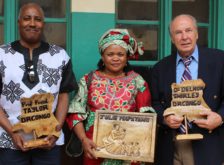 We began our second day in the village with a hike – which according to my Fitbit was a little over two and a half miles and equivalent to climbing forty flights of stairs. After a short stop at the guesthouse that Julie is building to house visitors who come to minster to the locals, we began our ascent of the mountain. Our objective was to see the source of the local water – a tiny spring which is being tapped to supply the needs of sixty-five hundred people. Next we visited the home of one of widows that Julie’s ministry, Redeeming Love, helps to support – a very basic mud hut. The lady also cares for one of the pigs that the ministry is raising as an income source for the villagers. Our next stop was at the pastor’s home, which is still under construction with partial support from Redeeming Love. When we came to the church property, we were able to see one of the taps that supplies water for the community. In the valley below the church, we came to the community garden where Redeeming Love trains the local families how to more effectively raise food with rotation of the crops throughout the year. The community garden serves multiple purposes in that it is a starter bed for the plants that are transplanted to the individual families’ gardens, a training plot for the farmers, a source of food for the school, a source of revenue for the church, and a source of inspiration for the community members who observe how well the members of Redeeming Love’s co-op are doing. Additionally, the community garden serves in an accountability role in that each family that is supported by the ministry is expected to put in a certain amount of work in the field each month. After completing the tour, we returned to Julie’s mother’s home where a full day of activities awaited. The front yard was filled with ladies who were packaging food – bags of beans, packets of salt, containers of cooking oil, sacks of rice, and pouches of sugar – and the living room was strewn with clothes and other random gifts. Soon, the entire neighborhood crowded into the courtyard. First on the agenda was a time of words of encouragement where we shared from the Bible and personal testimony that God – not a charitable person or organization – was their source and that they could learn to depend upon His provision and someday even become the ones who are giving out the packets of food rather than the ones receiving them. As the names of the children who are part of the program were called, each child along with his or her caregiver came forward to receive the parcels of food and a bar of soap. Once everyone had received his or her gift,
We began our second day in the village with a hike – which according to my Fitbit was a little over two and a half miles and equivalent to climbing forty flights of stairs. After a short stop at the guesthouse that Julie is building to house visitors who come to minster to the locals, we began our ascent of the mountain. Our objective was to see the source of the local water – a tiny spring which is being tapped to supply the needs of sixty-five hundred people. Next we visited the home of one of widows that Julie’s ministry, Redeeming Love, helps to support – a very basic mud hut. The lady also cares for one of the pigs that the ministry is raising as an income source for the villagers. Our next stop was at the pastor’s home, which is still under construction with partial support from Redeeming Love. When we came to the church property, we were able to see one of the taps that supplies water for the community. In the valley below the church, we came to the community garden where Redeeming Love trains the local families how to more effectively raise food with rotation of the crops throughout the year. The community garden serves multiple purposes in that it is a starter bed for the plants that are transplanted to the individual families’ gardens, a training plot for the farmers, a source of food for the school, a source of revenue for the church, and a source of inspiration for the community members who observe how well the members of Redeeming Love’s co-op are doing. Additionally, the community garden serves in an accountability role in that each family that is supported by the ministry is expected to put in a certain amount of work in the field each month. After completing the tour, we returned to Julie’s mother’s home where a full day of activities awaited. The front yard was filled with ladies who were packaging food – bags of beans, packets of salt, containers of cooking oil, sacks of rice, and pouches of sugar – and the living room was strewn with clothes and other random gifts. Soon, the entire neighborhood crowded into the courtyard. First on the agenda was a time of words of encouragement where we shared from the Bible and personal testimony that God – not a charitable person or organization – was their source and that they could learn to depend upon His provision and someday even become the ones who are giving out the packets of food rather than the ones receiving them. As the names of the children who are part of the program were called, each child along with his or her caregiver came forward to receive the parcels of food and a bar of soap. Once everyone had received his or her gift, 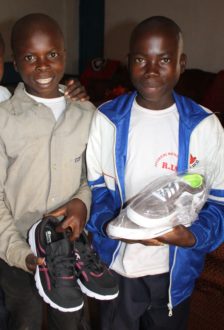 the children who had excelled in school during the current term were called forward. They were taken into the house and fitted with a new pair of shoes and given a parade baton and a cash reward. The distribution of gifts was followed by a victory parade around the compound. Next, the entire group of children was invited to join the parade as it exited the grounds. Each child received a handful of candy as he marched out. The local soccer team came next to receive new soccer balls. Now it was time for the widows. First on the agenda was for them to show their appreciation to Julie for all that she does for her village. They marched in with a goat, a big basket of potatoes and two big bags of vegetables – all the produce of their community garden. After a nice formal presentation and her acceptance speech, the names of the ladies who had fulfilled their commitments in the community garden were called and they stepped – and, in many cases, danced – to the front porch as Julie distributed a piece of beautiful fabric that could be fashioned in a nice new dress to each lady. Well, almost – there were several ladies who didn’t get the cloth. Of course, they were upset, but Julie explained that they had not fulfilled their required quota of working in the community garden at least once each week – a requirement not just just to get their help but also to make sure that they were learning the gardening skills that Redeeming Love believes will bring the community to a new economic level.
the children who had excelled in school during the current term were called forward. They were taken into the house and fitted with a new pair of shoes and given a parade baton and a cash reward. The distribution of gifts was followed by a victory parade around the compound. Next, the entire group of children was invited to join the parade as it exited the grounds. Each child received a handful of candy as he marched out. The local soccer team came next to receive new soccer balls. Now it was time for the widows. First on the agenda was for them to show their appreciation to Julie for all that she does for her village. They marched in with a goat, a big basket of potatoes and two big bags of vegetables – all the produce of their community garden. After a nice formal presentation and her acceptance speech, the names of the ladies who had fulfilled their commitments in the community garden were called and they stepped – and, in many cases, danced – to the front porch as Julie distributed a piece of beautiful fabric that could be fashioned in a nice new dress to each lady. Well, almost – there were several ladies who didn’t get the cloth. Of course, they were upset, but Julie explained that they had not fulfilled their required quota of working in the community garden at least once each week – a requirement not just just to get their help but also to make sure that they were learning the gardening skills that Redeeming Love believes will bring the community to a new economic level.
We left early in the morning of the next day for the long, dusty drive back to the city for our first crusade meeting with close to a thousand in attendance. After the service, the pastor said that when he first saw me, his first impression was that I was an old man. But after I preached, he thought that I was young and strong.
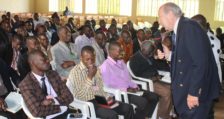 The following morning, we began the pastors’ conference with about six hundred in attendance. After the service, we fed the pastors a delicious lunch and spent some time fellowshipping with them. Afterwards, I was approached with the request to do a television interview.
The following morning, we began the pastors’ conference with about six hundred in attendance. After the service, we fed the pastors a delicious lunch and spent some time fellowshipping with them. Afterwards, I was approached with the request to do a television interview.
One highlight of the trip was the release of my book Finally, My Brethren in Swahili. We gave each pastor a copy of the new translation along with a few copies in French and English. We also introduced the new Swahili translation of So, You Wanna Be A Preacher, which will not be officially released until the next time we return to the DRC.
Our schedule for the following days began with a 6 AM prayer meeting, after which we rushed back to the guesthouse for breakfast and then back to the church for the conference meeting from 8 AM to noon. After lunch with the conference guests, we would go back to the guesthouse for showers (splash baths) since there was no electricity until about 5 AM, not giving us time to heat water and bath before leaving for the day. The afternoon meetings went from 3:30 PM to 6 PM with basically the church members in attendance. Of course, we couldn’t all fit in if the conference delegates and the church people into the building all at the same time.
Saturday was an especially busy day with the early-morning meeting, the morning conference, a wedding, the afternoon church, and the wedding reception. At the reception, I was seated at a table right at the head of the buffet line and got to joking around with the usher who was greeting the guests and handing them plates as they came up to get their food. After all the people had been served, I stood up and started doing a few African dance steps to the music. She joined me, and the next thing I knew, the MC for the evening was dragging us to the center stage in front of the bridal party. Of course, the whole crowd joined in almost instantly. I just hoped that I wasn’t embarrass the pastor (the father of the groom). After all, I was scheduled to preach at his church the following day.
When we gave the people a chance to come give testimonies, only about three of four shared that their pains had left. A gentlemen said to me over dinner that night that a lot of people were telling him that they had been healed but that they were just too bashful to speak into the mic. One young man came up to me later and said that he felt like he had just been let out of prison because of the teachings, He said that negative thoughts had held him captive until he got the revelation of the teaching. He added that this is the first time in his Christian life that he had felt the joy of the Lord. Another young man said that he was afraid to get married because he was afraid that he couldn’t afford a dowry or support a wife; now, he has faith that he can do it. Another gentleman said that he knows that the Holy Spirit had directed us to come to the Congo because the message has changed him and so many others. In one of the afternoon meetings, Fred asked for some more testimonies about things that had happened during the meetings. Surprisingly, people actually came up and took the mic this time. One lady said that she came to one of the services with a terrible stomach ache. She said that she was asking herself why she was even there because she was in so much pain that she could not pay attention to the teaching. But she was instantly healed after prayer and thanksgiving during the praise and worship. She then went home and prayed for her son who was also sick, and he was instantly healed. One man said that he felt the presence of the Lord so strongly that he thought that he was going to fall out in the floor. The pastor said that he has never cried in a service but that he was so moved by the teaching that he cried through one whole lesson. Another lady said that she had never seen a white man dance in the Holy Spirit before.
On Sunday, I preached in two churches. Fred preached the second service in the one where I had the early service. Both services were packed with about a thousand in each. The services were broadcast live on the local radio. The guard at the guesthouse said that he heard both services and was excited because he hadn’t known until then who we were. I preached at the church where we held the conference for the second service. It was almost impossible to get out of the church with everyone rushing up asking to have a photo before we left. After the service, they gave us a going away dinner with all kinds of speeches and gifts. The pastor actually cried when we got in the car to leave. That afternoon, we crossed the border into Rwanda and spent the night in a little hotel before flying into Kigali the next morning. Since we had a full day layover, we hired a car for the day and visited the Genocide Memorial, a church where I had preached before, and the hotel that the movie Hotel Rwanda was about. The interesting turn of events with this stop-over in Rwanda at the conclusion of the mission to the Congo was that through reconnecting with the pastor through of the church in Kigali I was offered an invitation to come and teach some short courses and seminars in the college that the church is opening later this year.
